For Elizabeth Warren, it was supposed to be one more big idea in a campaign built around them: a promise that everyone could get government-funded health care, following the lead of her friend and fellow White House hopeful Bernie Sanders. Instead, "Medicare for All" is posing one of the biggest challenges to the Massachusetts senator's candidacy.
Persistent questions about whether she would raise taxes on the middle class to pay for universal health coverage have dominated her campaign in recent weeks. Warren has refused to answer, arguing that it's more important to note that overall costs would fall for nearly everyone but large corporations and the wealthy.
That hasn't quelled the criticism and, recognizing the push for specifics isn't going away, Warren is promising to soon unveil details about how she would cover the costs of what would be a massive new federal entitlement. The release will test Warren's ability to navigate the Democratic primary as she balances the demands of progressives who are open to new taxes against skepticism from moderates who say such levies would doom her in a general election.
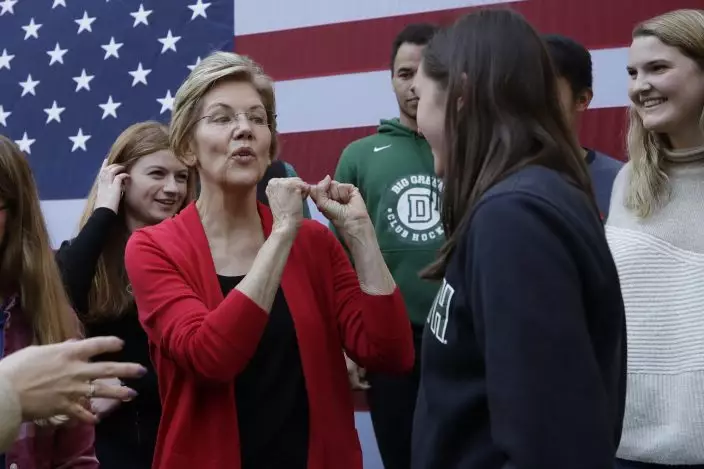
FILE - In this Oct. 24, 2019, file photo, Democratic presidential candidate Sen. Elizabeth Warren, D-Mass., speaks to young people at a campaign event at Dartmouth College in Hanover, N.H. For Warren, it was supposed to be another big idea in a campaign full of them: A promise that everyone could get government-funded health care, following the lead of her friend and fellow White House hopeful Bernie Sanders. (AP PhotoElise Amendola)
"She's trying to thread the needle between the electorate that wants a simple answer and the facts that she knows and that she has to live with at some point down the road," said Jim McDermott, a former Democratic congressman from Washington state who spent most of his career trying to move a "single-payer" plan.
With the first votes just over three months away, Warren could leave many disappointed.
If she aligns with Sanders, who acknowledges taxes will have to go up, she could further alarm Democrats worried she's pushing the party too far to the left. If she doesn't, that could alienate progressives who may accuse her plan of not going far enough. And any combination of the two might leave virtually everyone else still confused — wondering how to make the program's eye-popping math work.
That Warren is having to address health care questions on such starkly political terms may recall another, early campaign test she flunked: releasing the results of a DNA test last fall. Meant to quiet critics who questioned her past claims to Native American heritage, the move angered tribal leaders and energized critics like President Donald Trump who still gleefully deride Warren as "Pocahontas."
Warren says that, far from having boxed herself in politically, she's been working on her health care plan for months and still sees it as a winning issue. Her campaign has consulted experts, is reviewing Sanders' funding options on universal coverage going back to his 2016 presidential run and says it will always stay true to Warren's promises that health care costs rise for the rich and big firms while falling for "hard-working families."
One expert Warren's team has consulted is Robert Pollin, a University of Massachusetts Amherst economist who supports Medicare for All and has called for partially helping to pay for it using a sales tax.
"We should all pay something," said Pollin, who is a past donor to both Warren and Sanders but declined to discuss the specifics of his conversations with Warren's campaign. "You're going to get health care with no premiums, no deductibles, no fear of bankruptcy if you have a health emergency."
Warren has refused to commit to the idea of everyone paying a little. But presenting the payment specifics she's promised means necessarily grappling with the possibility of higher overall costs for the program, since making health care free for the patient would encourage people to use more services.
Sara Collins, vice president for coverage and access with the nonpartisan Commonwealth Club, said the key involves changing how the health care tab is divided up among employers, government and individuals.
"The overall growth in spending isn't that great, but it's the 'Who pays for it?' that really changes," said Collins, adding that costs would shift to the federal government, meaning "taxes will likely have to go up."
More pitfalls may emerge as the Warren campaign tries to estimate Medicare for All's cost. Since the final product would have to be approved by Congress, its contents are impossible to predict. A study released last week nonetheless estimated the government would need $2.7 trillion for Medicare for All to be fully implemented next year — more than half the current federal budget.
Sanders' campaign estimated that the universal health coverage plan he first introduced in 2016 would cost $14 trillion over the next decade. His estimates for the current race are far higher, though he now wants to offer more coverage.
Unlike Warren, Sanders has already released payment options, including higher taxes on wealthy Americans and an employee payroll tax of 7.5%. But he's also suggested a 4% "premium" on income that kicks in after the first $29,000 for a family of four — very much affecting the middle class.
Warren could possibly avoid that by imposing co-pay rules or limiting what's covered. Her plan may institute payroll taxes to transfer what employers already spend on employee health care through private insurance to government-run Medicare for All. But that would give federal authorities more control over employee health costs than employers, potentially affecting jobs.
"If your plan for health care involves the perception, even if it's not reality, that you're going to take away something that people have worked very hard to maintain — then it would be very problematic," said Brandon Dillon, former chairman of the Michigan Democratic Party.
Warren's predicament is striking since she emerged as a front-runner alongside former Vice President Joe Biden by proudly "having a plan" for everything but arguably the 2020 race's top issue. She's also spent months deftly floating above questions about paying for her other ambitious proposals, including offering universal child care and tuition-free education at public universities while canceling existing student debt, by proposing a wealth tax on the ultra-rich. That proposal effectively became a piggy bank to cover the costs of her other promises.
The wealth tax won't be enough to pay for Medicare for All, though. Warren's avoidance of the middle-class tax question has helped the issue linger as a political liability — and not just in Washington political circles.
Peter Schweyer, a Democrat in Pennsylvania's House of Representatives who is undecided in the presidential race, called pointed questions of Warren over Medicare for All during last week's presidential debate "really good."
"She'll need to figure out how to respond," Schweyer said.
Associated Press writers David Eggert in Lansing, Mich., and Marc Levy in Harrisburg, Pa., contributed to this report.
UNITED NATIONS (AP) — The United States vetoed a widely backed U.N. resolution Thursday that would have paved the way for full United Nations membership for Palestine, a goal the Palestinians have long sought and Israel has worked to prevent.
The vote in the 15-member Security Council was 12 in favor, the United States opposed and two abstentions, from the United Kingdom and Switzerland. U.S. allies France, Japan and South Korea supported the resolution.
The strong support the Palestinians received reflects not only the growing number of countries recognizing their statehood but almost certainly the global support for Palestinians facing a humanitarian crisis caused by the war in Gaza, now in its seventh month.
The resolution would have recommended that the 193-member U.N. General Assembly, where there are no vetoes, approve Palestine becoming the 194th member of the United Nations. Some 140 countries have already recognized Palestine, so its admission would have been approved, likely by a much higher number of countries.
U.S. deputy ambassador Robert Wood told the Security Council that the veto “does not reflect opposition to Palestinian statehood but instead is an acknowledgment that it will only come from direct negotiations between the parties."
The United States has “been very clear consistently that premature actions in New York — even with the best intentions — will not achieve statehood for the Palestinian people,” deputy State Department spokesman Vedant Patel said.
His voice breaking at times, Palestinian U.N. Ambassador Riyad Mansour told the council after the vote: “The fact that this resolution did not pass will not break our will and it will not defeat our determination.”
“We will not stop in our effort,” he said. “The state of Palestine is inevitable. It is real. Perhaps they see it as far away, but we see it as near.”
This is the second Palestinian attempt for full membership and comes as the war in Gaza has put the more than 75-year-old Israeli-Palestinian conflict at center stage.
Palestinian President Mahmoud Abbas first delivered the Palestinian Authority’s application for U.N. membership in 2011. It failed because the Palestinians didn’t get the required minimum support of nine of the Security Council’s 15 members.
They went to the General Assembly and succeeded by more than a two-thirds majority in having their status raised from a U.N. observer to a non-member observer state in 2012. That opened the door for the Palestinian territories to join U.N. and other international organizations, including the International Criminal Court.
Algerian U.N. Ambassador Amar Bendjama, the Arab representative on the council who introduced the resolution, called Palestine’s admission “a critical step toward rectifying a longstanding injustice" and said that “peace will come from Palestine’s inclusion, not from its exclusion.”
In explaining the U.S. veto, Wood said there are “unresolved questions” on whether Palestine meets the criteria to be considered a state. He pointed to Hamas still exerting power and influence in the Gaza Strip, which is a key part of the state envisioned by the Palestinians.
Wood stressed that the U.S. commitment to a two-state solution, where Israel and Palestine live side-by-side in peace, is the only path for security for both sides and for Israel to establish relations with all its Arab neighbors, including Saudi Arabia.
“The United States is committed to intensifying its engagement with the Palestinians and the rest of the region, not only to address the current crisis in Gaza, but to advance a political settlement that will create a path to Palestinian statehood and membership in the United Nations,” he said.
Mansour, the Palestinian U.N. ambassador, reiterated the commitment to a two-state solution but asserted that Israel believes Palestine "is a permanent strategic threat."
"Israel will do its best to block the sovereignty of a Palestinian state and to make sure that the Palestinian people are exiled away from their homeland or remain under its occupation forever,” he said.
He demanded of the council and diplomats crowded in the chamber: “What will the international community do? What will you do?”
Israeli-Palestinian negotiations have been stalled for years, and Israel’s right-wing government is dominated by hard-liners who oppose Palestinian statehood.
Israeli U.N. Ambassador Gilad Erdan called the resolution “disconnected to the reality on the ground” and warned that it “will cause only destruction for years to come and harm any chance for future dialogue.”
Six months after the Oct. 7 attack by the Hamas militant group, which controlled Gaza, and the killing of 1,200 people in “the most brutal massacre of Jews since the Holocaust,” he accused the Security Council of seeking “to reward the perpetrators of these atrocities with statehood.”
Israel’s military offensive in response has killed over 32,000 Palestinians, according to Gaza’s health ministry, and destroyed much of the territory, which speaker after speaker denounced Thursday.
After the vote, Erdan thanked the United States and particularly President Joe Biden “for standing up for truth and morality in the face of hypocrisy and politics.”
He called the Palestinian Authority — which controls the West Bank and the U.S. wants to see take over Gaza where Hamas still has sway — “a terror supporting entity.”
The Israeli U.N. ambassador referred to the requirements for U.N. membership – accepting the obligations in the U.N. Charter and being a “peace-loving” state.
“How can you say seriously that the Palestinians are peace loving? How?” Erdan asked. “The Palestinians are paying terrorists, paying them to slaughter us. None of their leaders condemns terrorism, nor the Oct. 7 massacre. They call Hamas their brothers.”
Despite the Palestinian failure to meet the criteria for U.N. membership, Erdan said most council members supported it.
“It’s very sad because your vote will only embolden Palestinian rejectionism every more and make peace almost impossible,” he said.
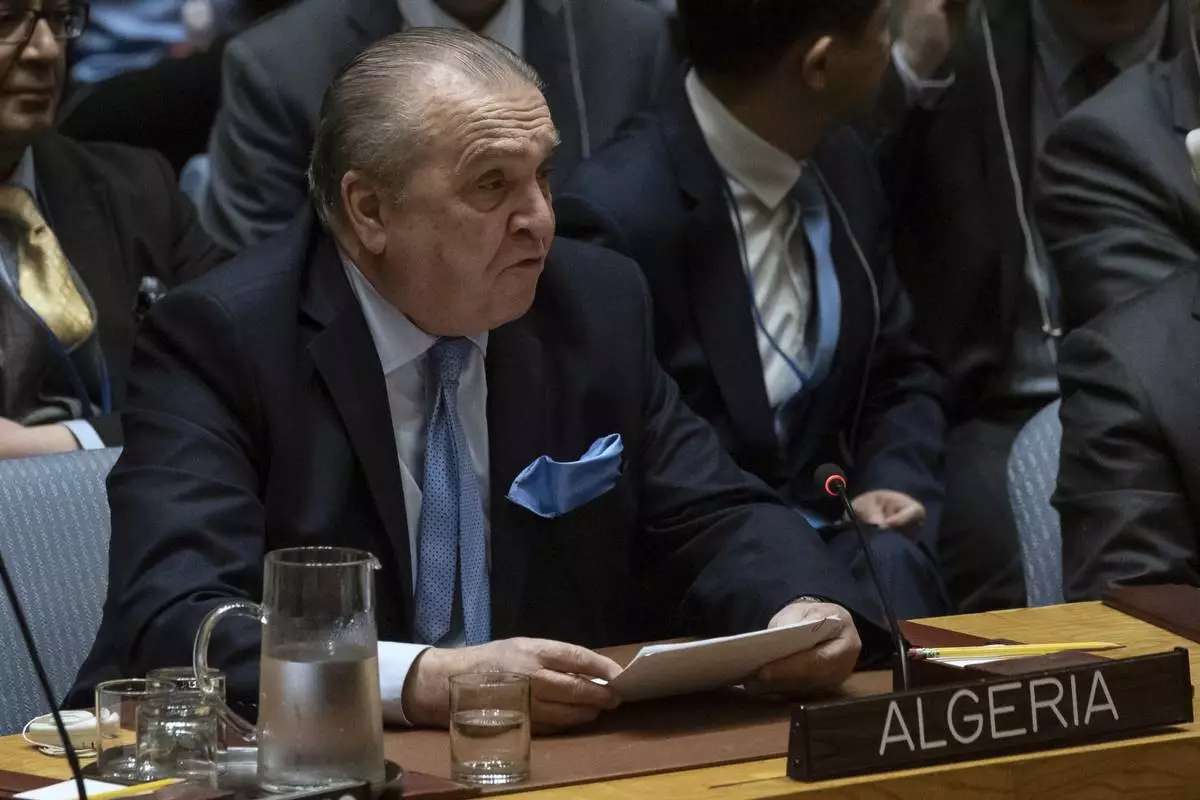
Algeria's Permanent Ambassador to the United Nations Amar Bendjama speaks during a Security Council meeting at United Nations headquarters, Thursday, April 18, 2024. (AP Photo/Yuki Iwamura)
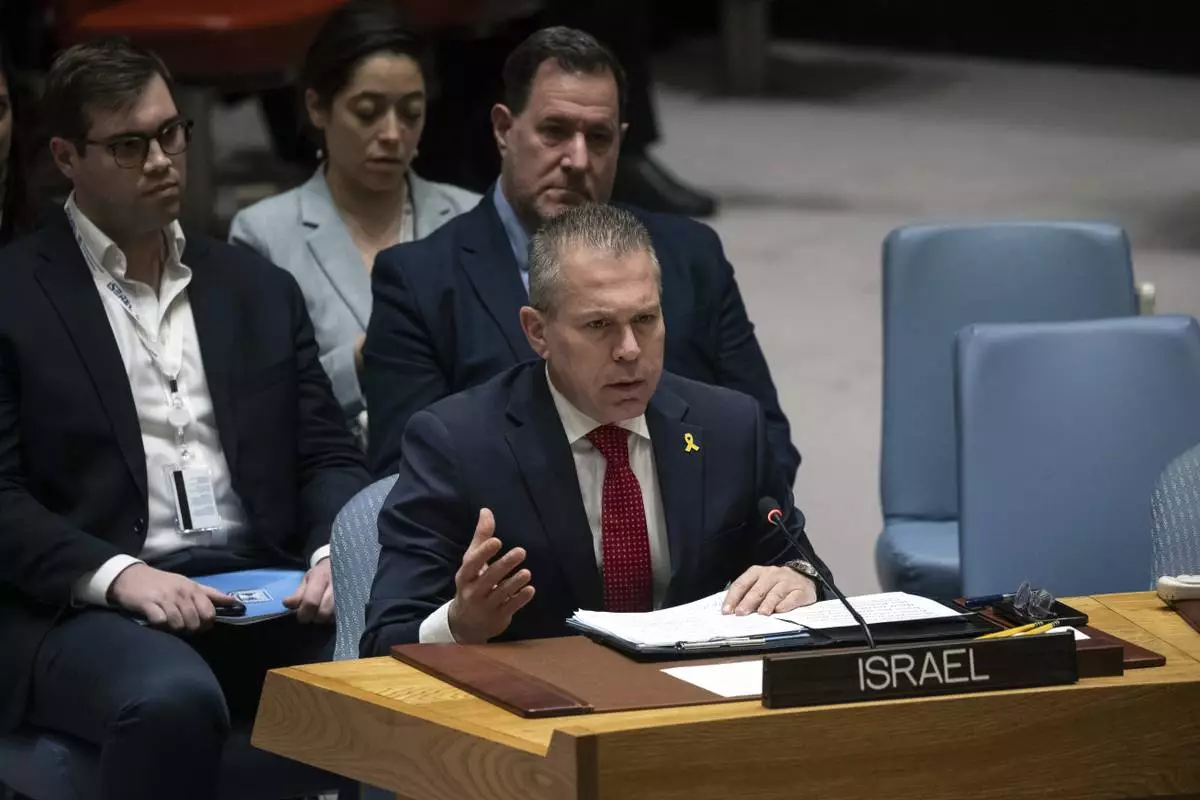
Israeli Ambassador to the United Nations Gilad Erdan speaks during a Security Council meeting at United Nations headquarters, Thursday, April 18, 2024. (AP Photo/Yuki Iwamura)
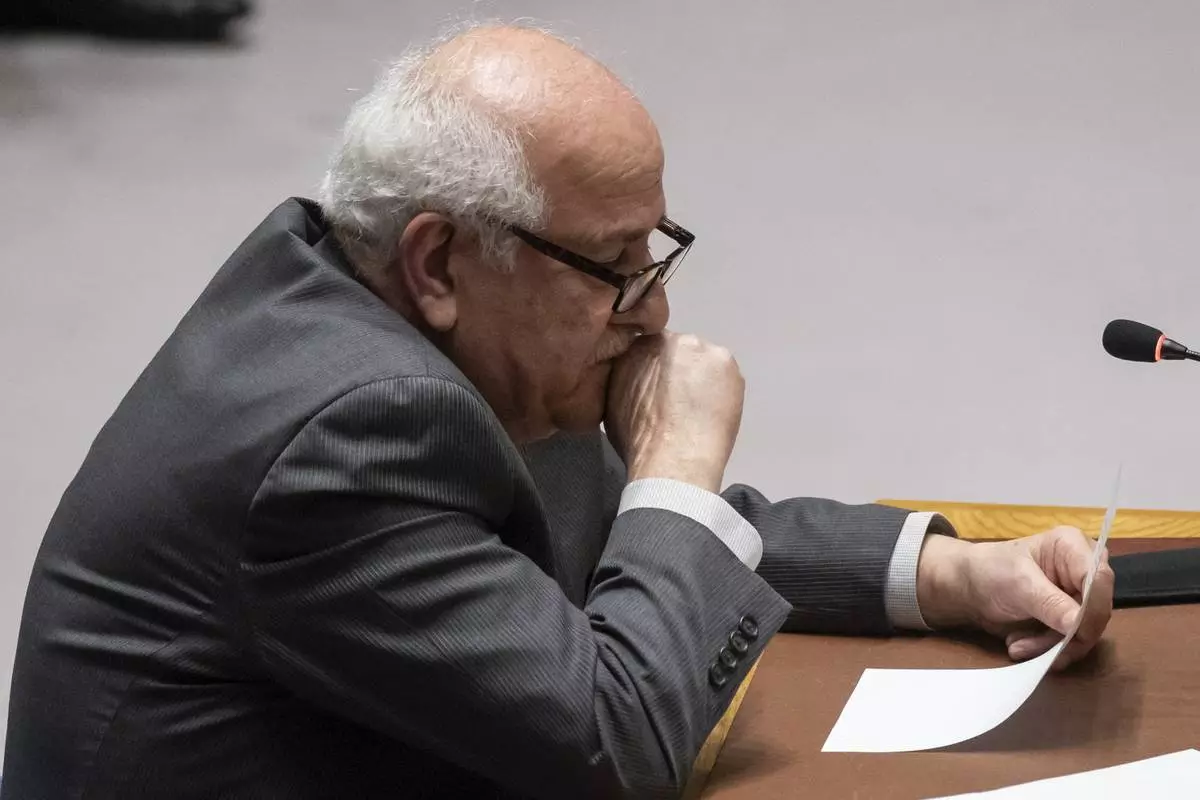
Palestinian Ambassador to the United Nations Riyad Mansour holds tears while speaking during a Security Council meeting at United Nations headquarters, Thursday, April 18, 2024. (AP Photo/Yuki Iwamura)
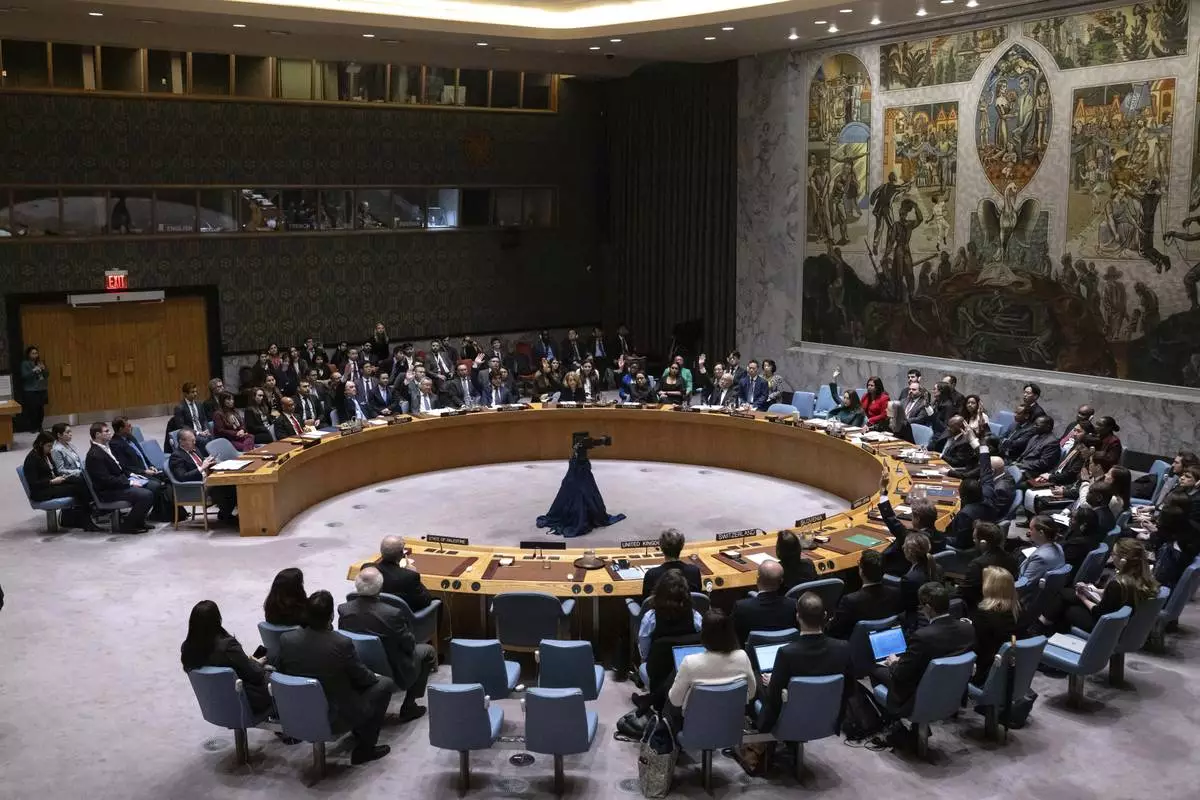
Representatives of member countries take votes during a Security Council meeting at United Nations headquarters, Thursday, April 18, 2024. (AP Photo/Yuki Iwamura)
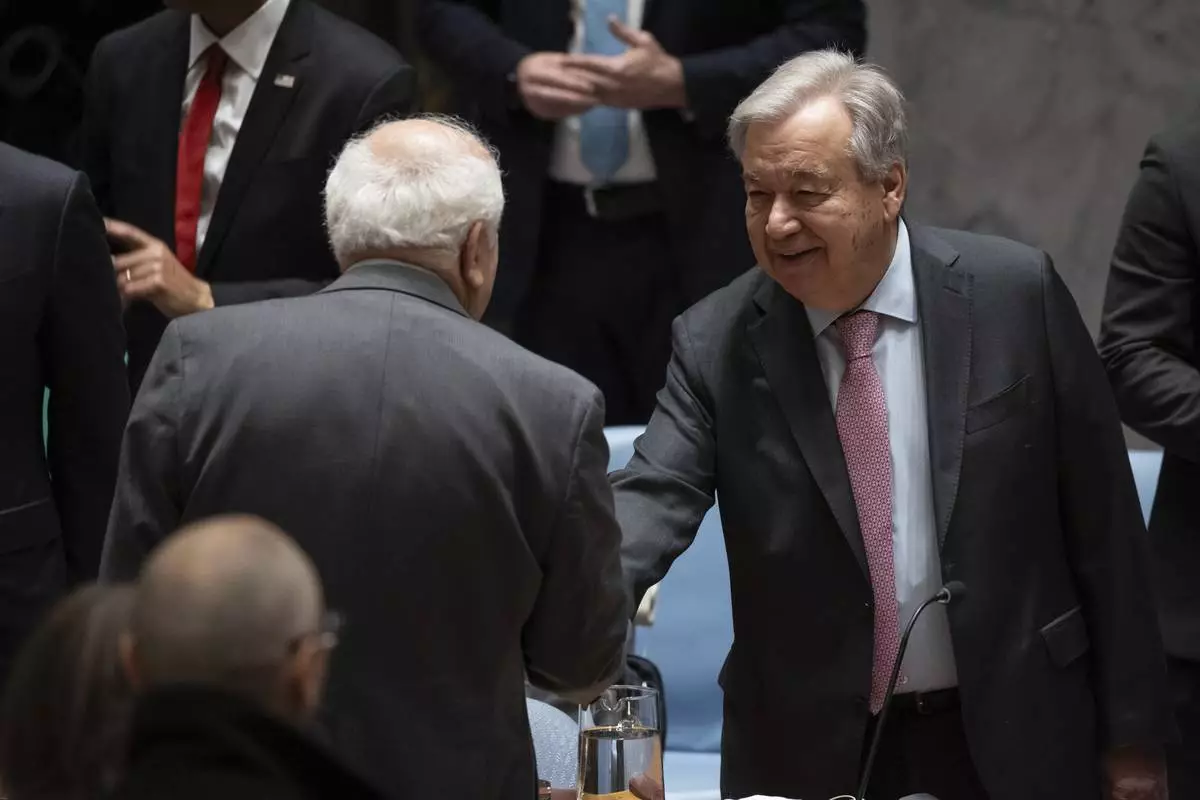
Palestinian Ambassador to the United Nations Riyad Mansour, left, and United Nations Secretary-General Antonio Guterres speak before a Security Council meeting at the United Nations headquarters, Thursday, April 18, 2024. (AP Photo/Yuki Iwamura)
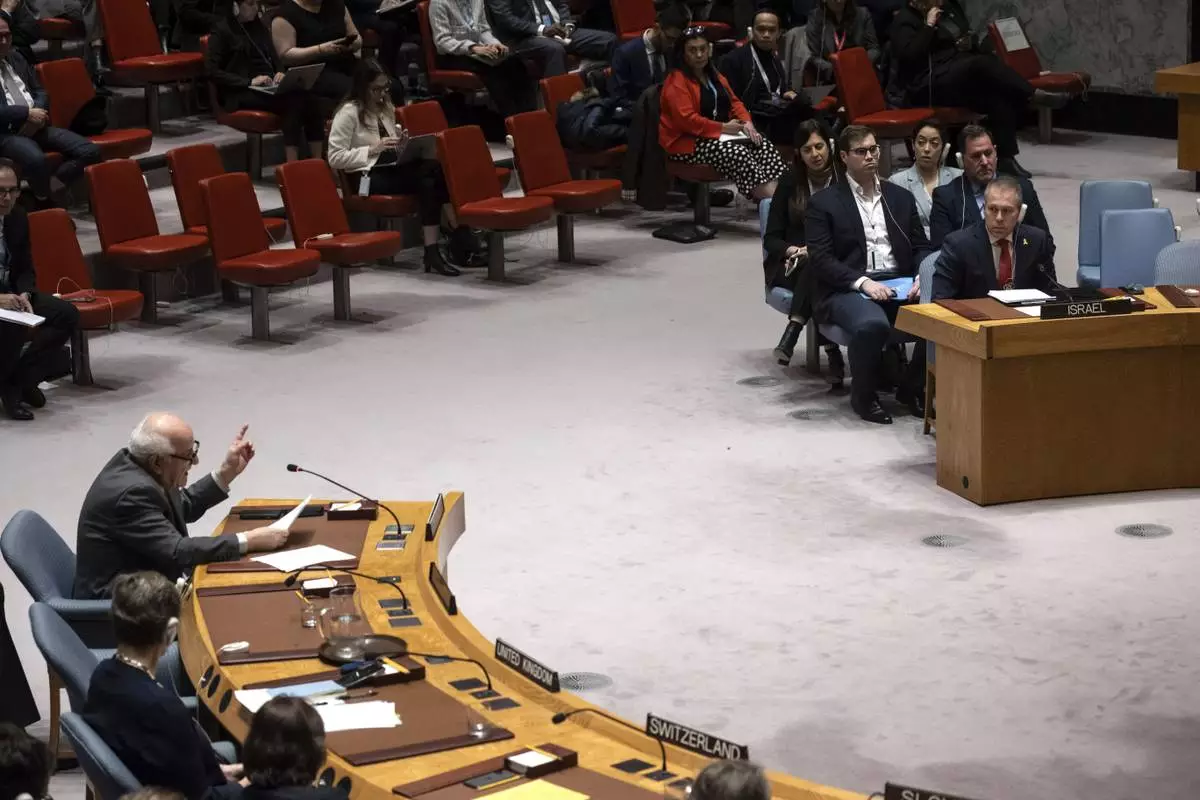
Palestinian Ambassador to the United Nations Riyad Mansour speaks during a Security Council meeting at United Nations headquarters, Thursday, April 18, 2024. (AP Photo/Yuki Iwamura)
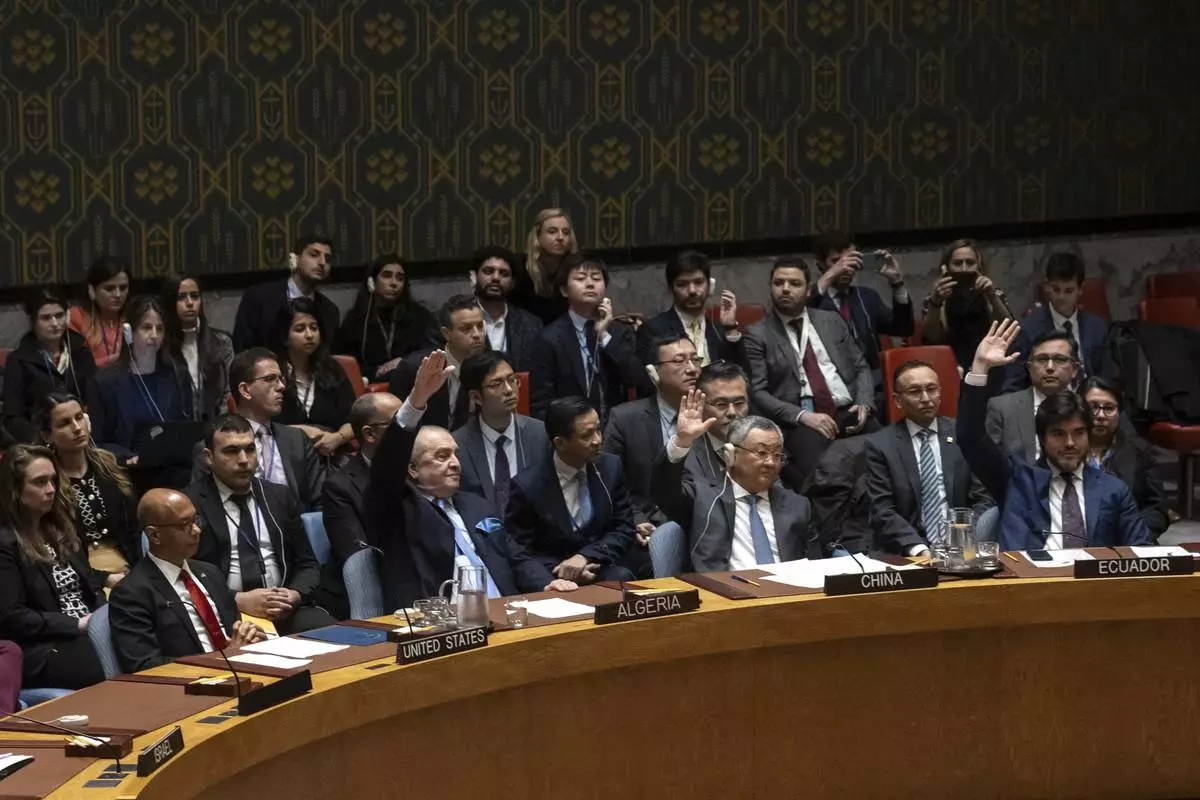
Representatives of member countries take votes during a Security Council meeting at United Nations headquarters, Thursday, April 18, 2024. (AP Photo/Yuki Iwamura)
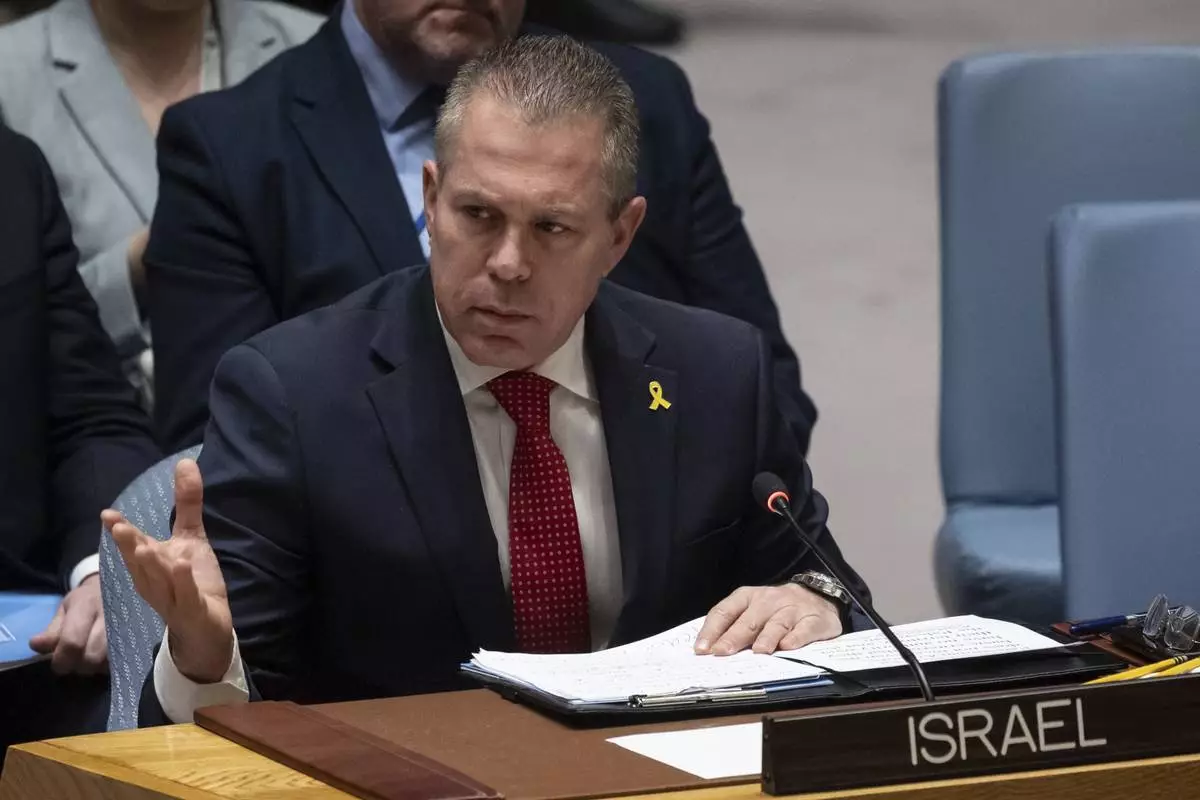
Israeli Ambassador to the United Nations Gilad Erdan speaks during a Security Council meeting at United Nations headquarters, Thursday, April 18, 2024. (AP Photo/Yuki Iwamura)
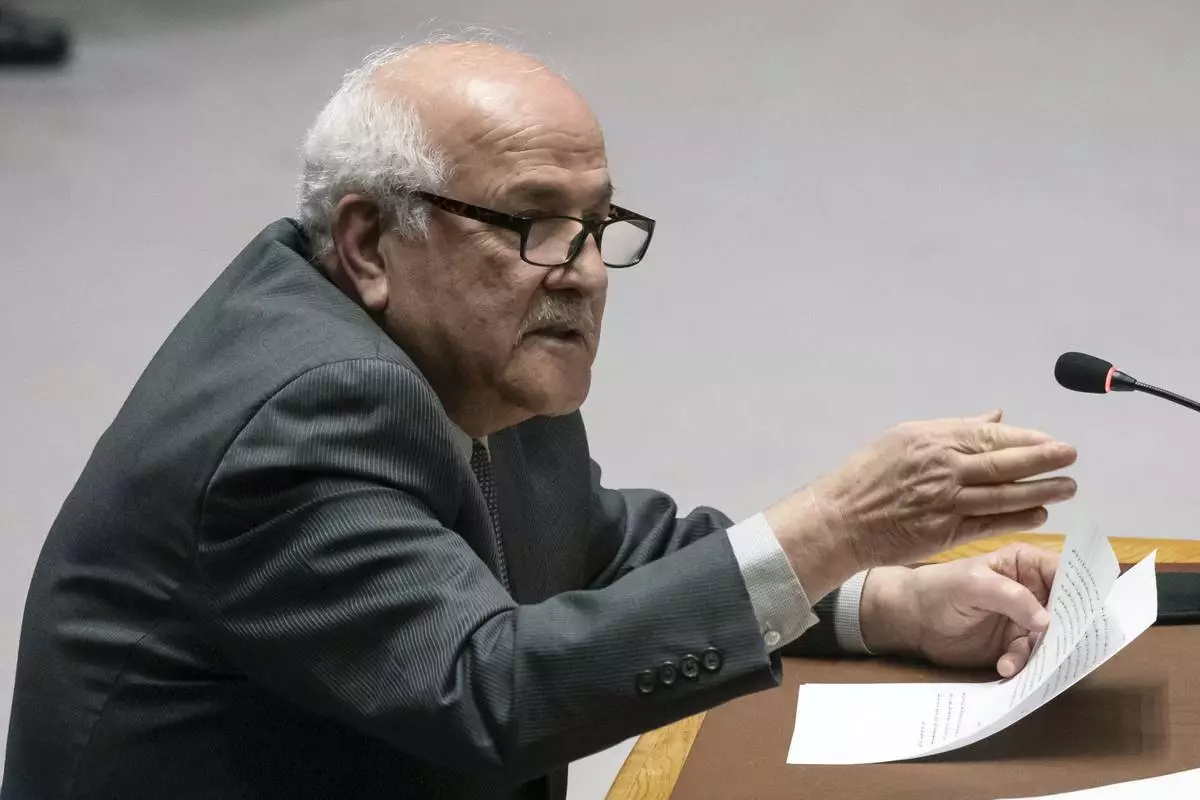
Palestinian Ambassador to the United Nations Riyad Mansour speaks during a Security Council meeting at United Nations headquarters, Thursday, April 18, 2024. (AP Photo/Yuki Iwamura)
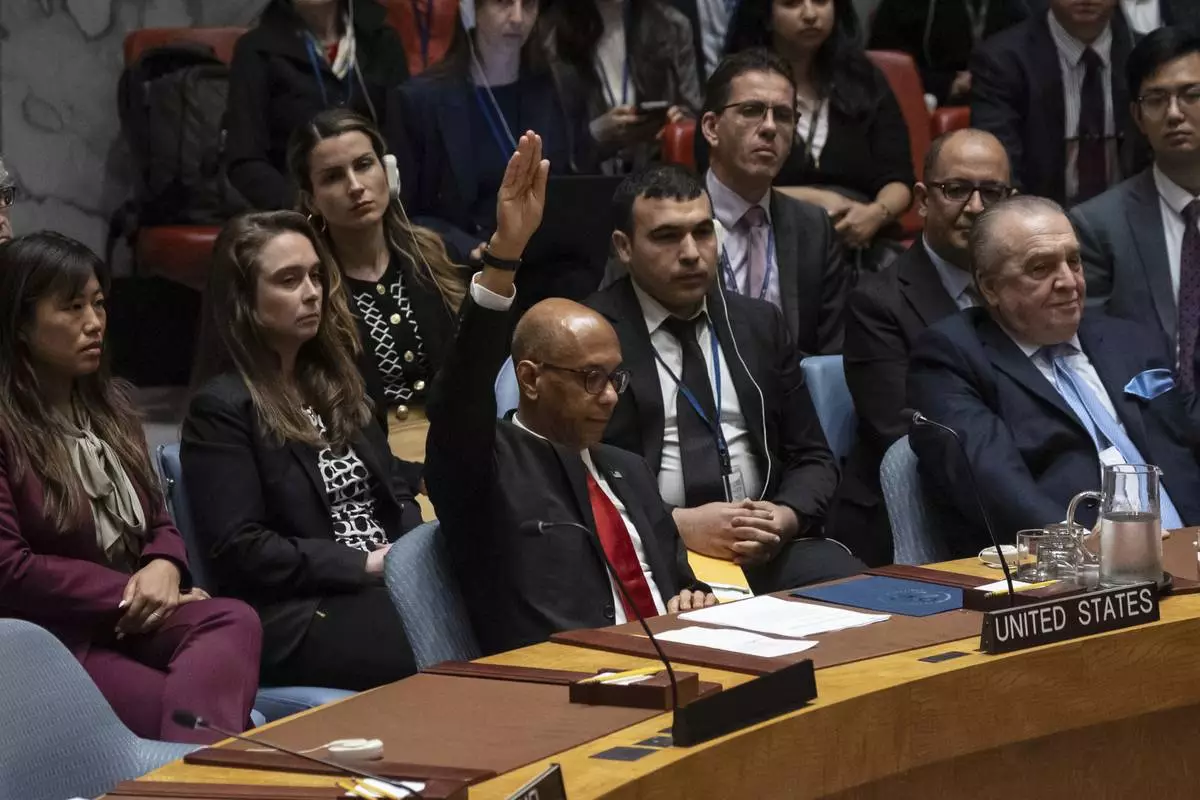
U.S. Deputy Ambassador Robert Wood votes against resolution during a Security Council meeting at United Nations headquarters, Thursday, April 18, 2024. (AP Photo/Yuki Iwamura)




















